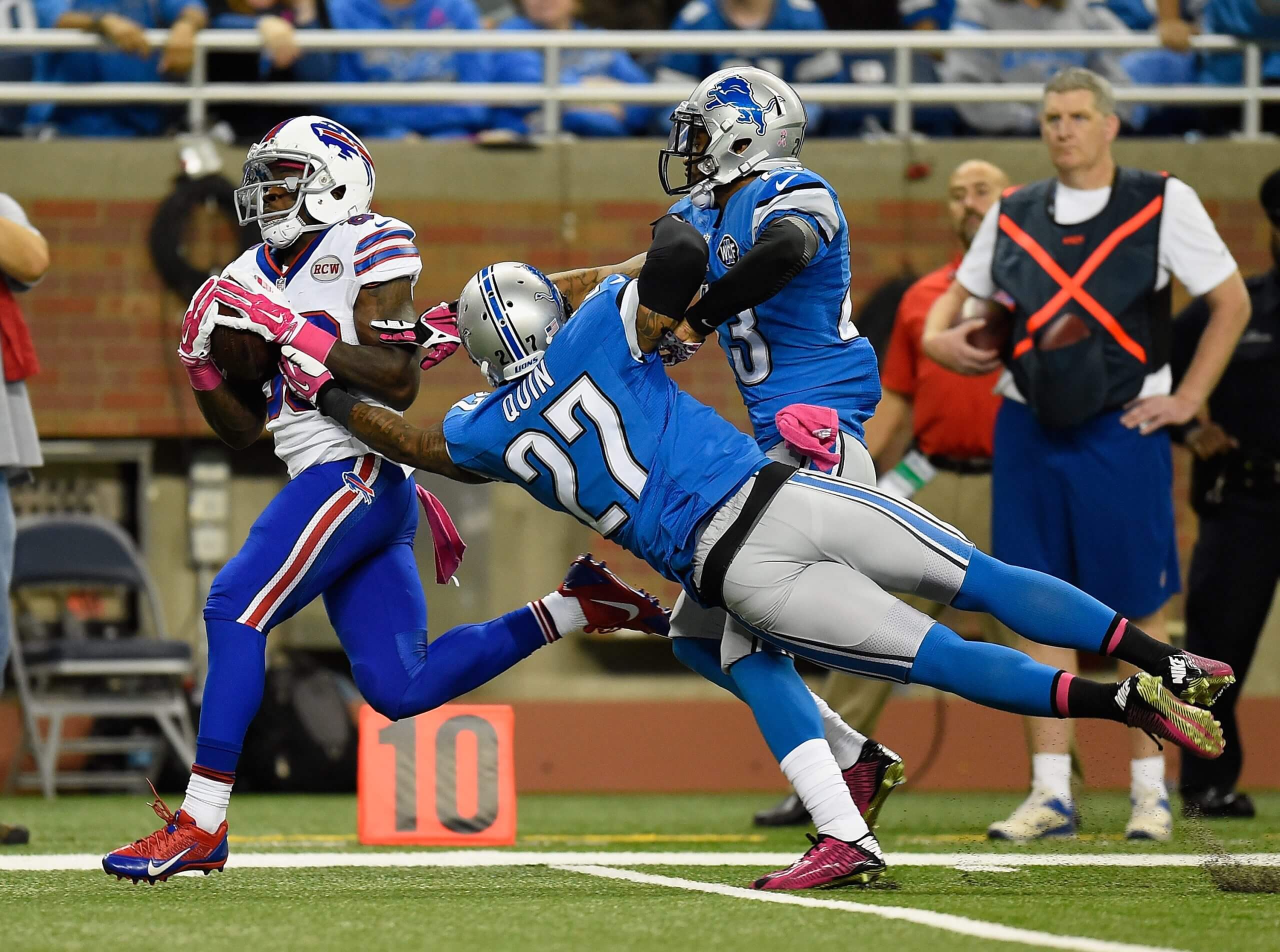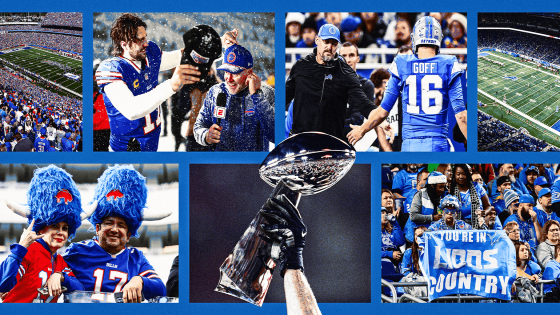There’s a long history of Buffalo and Detroit sharing their inspirational figures.
Joyce Carol Oates and Rick James, Bob Lanier and Pat LaFontaine.
They’ve easily crisscrossed the path around Lake Erie, whether by Interstate 90 or Ontario’s Highway 401, to find a familiar setting on the other end — another vibrant Rust Belt city that’s been kicked in the teeth but refuses to roll over. They’re union towns, hard-drinking towns. They’re poorer than most places their size. On the Canadian border, Tim Hortons is a local coffee shop and Labatt Blue is considered a domestic beer. Their sports teams are oxygen.
And, for generations, the Buffalo Bills and Detroit Lions have deprived them.
There’ve been successes, of course: the Bills with their back-to-back AFL titles in the 1960s and four straight Super Bowl losses three decades back, the Lions with their pre-JFK dominance and Barry Sanders’ resplendence until too much dysfunction made him quit.
Who could have entertained the notion of Buffalo and Detroit playing for the Lombardi Trophy?
“It would be a Super Bowl made in heaven,” said Mary Wilson, widow of Bills founder and Detroit businessman Ralph Wilson. “It would be awesome.”
A possible championship preview will be the chief storyline on Sunday when two ringless franchises meet at Ford Field. The 12-1 Lions have been betting favorites to win the NFC, while the 10-3 Bills last week slipped back to the second-best odds in the AFC behind the Kansas City Chiefs, whom the Bills conquered last month.
Just three seasons ago, each fan base wanted to lash its head coach to a downriver barge. Lions coach Dan Campbell is the clear favorite for Coach of the Year. Bills coach Sean McDermott locked up his fifth straight AFC East crown with a month’s worth of games remaining.
“There are so many commonalities,” said John Beilein, former basketball coach at Canisius College and the University of Michigan. Beilein, a lifelong Bills fan from nearby Burt, N.Y., is the Detroit Pistons’ senior adviser for player development.
“It’s amazing how these teams have evolved. They’ve each had a renaissance, with their cultures of being good, smart teams that don’t beat themselves. Dan Campbell could run for mayor, governor, senator and he would win.”
Buffalo and Detroit are interchangeable when it comes to the old “drinking town with a football problem” quip.
Their NFL teams matter so much, at least in part, because they savor a happy distraction. Recent data shows they rank similarly among large metros in unionization (Buffalo first, Detroit seventh), poverty (Detroit second, Buffalo third) and excessive drinking (Buffalo fourth, Detroit 13th).
“It’s cold and dreary and gloomy and not a whole lot else to do, so they latch onto their teams,” said former Bills and Lions tight end Pete Metzelaars, who grew up in Michigan between Detroit and Chicago. “They’re towns that fell on hard times and needed to transition, needed to recreate themselves — much like their football teams.
“Buffalo lives and dies and bleeds with the Bills. The city’s hopes and dreams rise and fall whenever the Bills win or lose, walking around Monday morning all wowsy wowsy woo woo. Detroit’s been waiting for years and years and years to have a successful team. Now they’re living and dying with the Lions too.”
Sports examples of Detroit-Buffalo commingling are abundant. Chris Spielman was a heart-and-soul linebacker in both cities. Popular Bills quarterbacks Joe Ferguson and Frank Reich made their final starts for the Lions.
Dominik Hasek, the Buffalo Sabres’ greatest goaltender, lifted the Stanley Cup twice with the Detroit Red Wings. Sabres great Danny Gare later became the Red Wings’ captain. Roger Crozier took the Conn Smythe Trophy with Detroit before becoming the first goalie in Sabres history.
No. 16 hangs from the rafters at each downtown arena. Lanier, the Bennett High and St. Bonaventure legend, is honored by the Pistons in Little Caesars Arena. LaFontaine, the Hall of Fame center who grew up in suburban Detroit, saw his number retired in KeyBank Center.
But it was Ralph Wilson who made the greatest crossover impact.
Wilson was a charter member of the Foolish Club, the group of firebrands who launched the AFL in 1960. The Detroit insurance, construction, trucking and broadcasting magnate owned a minority stake in the Lions and endeavored to be a full NFL owner, but he grew tired of the league’s reluctance to expand and threw in with the AFL instead. Wilson initially tried to put his team in Miami, but when the city refused to lease the Orange Bowl, he shifted to Buffalo.
“The reason Ralph went to Buffalo was because he was told it was such a great sports town, and Buffalo lived up to it,” Mary Wilson said. “Two great football cities. Detroit is an unbelievable sports town, but the greatest fans are the Buffalo Bills’.”
The Lions’ influence on the original Bills was unmistakable. Ralph Wilson hired Lions defensive coordinator Buster Ramsey as the Bills’ first head coach. The Bills also adopted the Lions’ uniform and helmet colors (Honolulu blue, silver and white), but switched to their current colors for their third season. A Bills-Lions summer exhibition was common from 1967 until the NFL took over preseason scheduling from individual clubs a few years ago.
Wilson remained dear friends with Lions owner William Clay Ford Sr. until their deaths 16 days apart in March 2014.
Mary Wilson assumed controlling ownership of the Bills until they were sold. Terry and Kim Pegula made the highest bid at $1.4 billion. It was a formality when NFL owners approved the Pegulas’ purchase at an Oct. 8 meeting that had been on the league’s calendar for over a year.
The date provided a poetic transition. Mary Wilson knew the final game of Ralph’s ownership era would conclude three days before the vote. She was there, sitting in the Lions season tickets Ralph maintained for over half a century, as the Bills won 17-14 in Ford Field.

Now she helps oversee the Ralph C. Wilson Jr. Foundation, endowed with $1.2 billion from the Bills sale, with a focus on awarding grants in Western New York and Southeast Michigan. A major initiative was committing $200 million to transform underused parks into community destinations. Buffalo’s old LaSalle Park on the Niagara River became the 100-acre Ralph Wilson Park, and Detroit’s derelict West Riverfront Park is being turned into the new Ralph C. Wilson Jr. Centennial Park.
Not since landscape-architect grand master Frederick Law Olmsted created Buffalo’s parks system and Detroit’s Belle Isle Park in the late 1800s have the cities’ green spaces been so enriched.
“The two parks on the riverfront in Detroit and in Buffalo, they’re going to be Ralph’s greatest legacy,” Mary Wilson said.
Ralph Wilson would have emitted that trademark cackle upon learning his Bills were sold to a boyhood Lions fan. Terry Pegula grew up in Northeast Pennsylvania, but he adored Detroit Tigers right fielder Al Kaline. Pegula found it natural to adopt the Lions as his NFL team, too. Although never a Red Wings guy, Pegula tried to apply a heavy dose of “Hockeytown” mystique by branding his Sabres enterprise “Hockey Heaven.” The name didn’t stick.
Pegula has enjoyed substantially more success with his football club. From his first full season as owner, the Bills have a .611 win percentage (compared to a .463 win percentage before), reached the postseason in nine out of 10 seasons and endured just two losing seasons.
Two of the Bills’ victories happened with the Lions’ critical assistance.
Buffalo is the “City of Good Neighbors,” but the Lions twice came to the Bills’ rescue when deadly snowstorms struck Western New York and forced games to be relocated. At Ford Field, the Bills rolled the New York Jets in November 2014 and the Cleveland Browns in November 2022.
Over the 64 years the Bills and Lions have existed, they’ve made the playoffs in the same season just five times. Before last year, they won a playoff game in the same season once. It happened in 1991, the Lions’ lone postseason victory between their 1957 NFL title and last year.
“My coaching years at Michigan were the same years the Bills were bad,” Beilein said, referring to Buffalo’s 17-year playoff drought that ended in 2017. “They went through three or four coaches, and so did Detroit. I had several guys on my staff and on the team from the Detroit area, and just remember lamenting about our teams and the misery-loving-company I had with all the Detroit fans. It connected us. A new coach, a new optimism, and there we are all over again.”
But the possibility of Detroit and Buffalo playing in the Super Bowl has added significance because somebody finally would win one.
A wonderful feat to win the AFC and advance four straight winters, but the Bills’ inability to cash any of their opportunities is an organizational scar.
From the group of 28 teams that existed upon the NFL’s 1976 expansion, the Lions and Browns officially are the last franchises without a Super Bowl trip, although the original Browns did morph into the Baltimore Ravens, winners of two Lombardi Trophies.
To explore what an NFL championship would mean to Buffalo or Detroit, scant better options exist than Mike Lodish, a native Detroiter and 11-year NFL defensive tackle. Lodish played in a record six Super Bowls. After appearing in all the Bills’ defeats, he earned two championship rings with the Denver Broncos.
“The biggest similarity between the two cities — more than being blue collar and the Great Lakes and all the manufacturing — is how their fan bases have such a desire to win a championship,” Lodish said. “Both Buffalo and Detroit need it because they haven’t had one. The need is monumental.
“If the Tampa Bay Buccaneers can win a Super Bowl, why can’t Detroit or Buffalo? Ultimately, it’s everything.”
Everyone interviewed for this story, however, insisted a championship parade would have greater significance to Buffalo. They’re all rooting accordingly.
Detroit, after all, has reveled in sports glory this century through the Red Wings, Pistons, Tigers, Wolverines and Spartans.
Mary Wilson sold the house in Grosse Pointe Shores, Mich., last month and considers herself a Western New Yorker these days. She got rid of her suite at Highmark Stadium, she said, because she got tired of playing hostess and simply wanted to concentrate on the game. So she has six Bills season tickets out in the crowd now.
She also still has two of Ralph’s six Lions season tickets. Mary will be sitting in Ford Field on Sunday, but cheering for the visitors.
“I’m really looking forward to this game,” Mary Wilson said. “People ask me, ‘Who are you going to pull for?’ I go, ‘Are you kidding?’ I never go against the Bills.”
(Top photo: Andy Lyons / Allsport, Kevin Sabitus, Harry How, Timothy T Ludwig, Mike Mulholland, Leon Halip / Getty Images, Steven King / Icon Sportswire)





